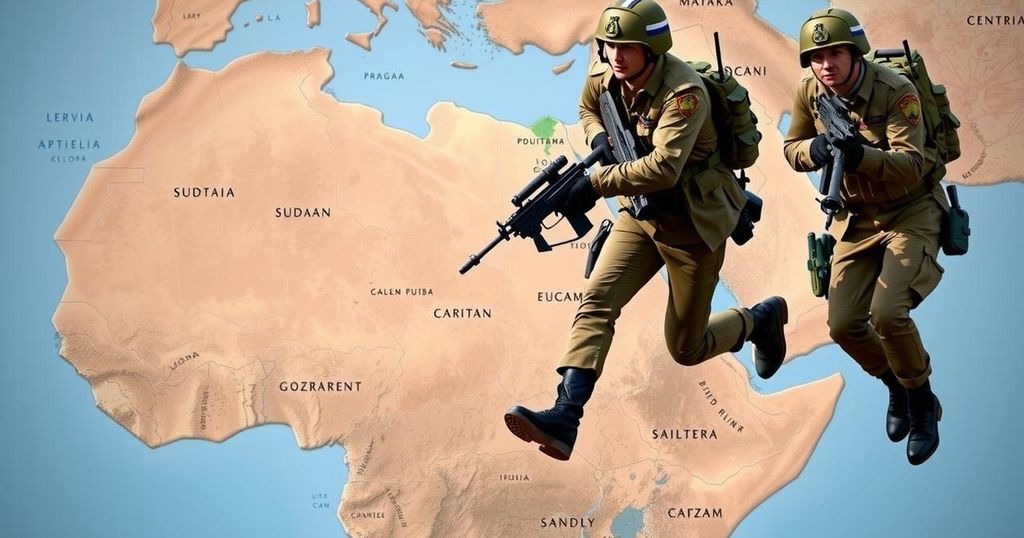Russia Eyes Sudan and Libya Amid Potential Loss of Syrian Base

The fall of Assad in Syria presents a significant challenge for Russia’s global ambitions, leading it to seek new bases in Sudan and Libya for military operations. The potential loss of its Syrian naval and air bases threatens Russian influence in the Mediterranean, prompting a reassessment of its strategies in Africa, where the Wagner Group is active in securing valuable resources and supporting local regimes. The complexities of military logistics and diplomatic relationships could impede Russian efforts to maintain its geopolitical presence.
The recent developments regarding the Syrian conflict have compelled Russia to reassess its military operations in the region and consider alternative locations for its strategic ambitions in Africa. With the potential fall of Bashar al-Assad and the consequent loss of military bases in Syria, Russia is likely to focus its efforts on war-torn nations like Sudan and the politically fractionalized Libya to maintain its geopolitical influence and military presence in the Mediterranean and beyond. The Institute for the Study of War indicates that the shift from Syria may undermine Russian objectives, which heavily rely on maintaining a naval foothold to project power in vital waterways.
In 2015, Russia intervened in Syria to support Assad, bolstering its military presence through bases at Tartus and Khmeimim. However, with escalating rebellion against Assad, the prospect of losing these installations presents a strategic setback, compelling the Kremlin to seek new operational bases elsewhere. Russia has already demonstrated a vested interest in Sudan and Libya, leveraging its military contractor Wagner Group to secure mining rights and assist local regimes in exchange for lucrative deals. Observations indicate that the Wagner Group has generated billions through illicit operations since Russia’s increased involvement in Africa post-invasion of Ukraine.
In Sudan, an agreement to establish a naval base at Port Sudan has been in discussions since 2017, but political instability has thwarted implementation. As the conflict continues to evolve with multiple factions, including the Sudanese Armed Forces and the Rapid Support Forces, Russia’s dual support raises questions about its long-term commitments. Alternately, Libya, with its rich oil and mineral resources, remains a target for Russian military expansion, with the Africa Corps now orchestrating military operations to support factions like General Haftar.
Analysts suggest that while Russia seeks to replace the strategic capabilities of its Syrian bases, it faces challenges in establishing robust, formal agreements in Sudan and Libya that would allow it to operate effectively. The intricate dynamics of local governance, alongside international political repercussions, complicate the Kremlin’s efforts to secure another visible military footprint in North Africa.
Overall, as Russia navigates these tumultuous political landscapes, it remains pivotal for Moscow to consolidate its interests in the Middle East and Africa to maintain operational relevance and counterbalance Western influence in the region.
Ultimately, Russia’s shifting strategy in the face of an evolving geopolitical landscape underscores its persistent ambitions to re-establish itself as a dominant player on the global stage, particularly in the Mediterranean region.
The current geopolitical situation reflects Russia’s attempts to regain influence in the Middle East and Africa following potential losses in Syria. The strategic military installations in Syria, which have been vital for Russian operations, now face jeopardy due to a shift in power dynamics. In light of this, Russia’s focus is increasingly turning towards nations like Sudan and Libya, where it can solidify its military presence and economic interests amidst ongoing conflicts. The involvement of the Wagner Group in securing local resources through mercenary operations provides Russia with financial leverage and a foothold to counter Western ambitions in these regions. Moreover, the Kremlin is under pressure to effectively assert its power now that its historical influence in Syria could diminish. Observing and participating in conflicts in both Sudan and Libya not only offers new avenues for resource acquisition but also helps Russia to counterbalance NATO’s presence, particularly in the Mediterranean and Red Sea.
In summary, the potential loss of Russian military assets in Syria necessitates a strategic pivot towards Sudan and Libya as alternative bases for its operations in Africa. While Russia has attempted to cultivate relationships in these war-torn countries, the challenges of local governance and international scrutiny may hinder its ability to replicate the strategic advantages held in Syria. As the situation unfolds, Russia’s commitment to establishing a robust presence in Africa will remain a complex interplay of militaristic ambition and realpolitik maneuvering.
Original Source: www.intellinews.com







